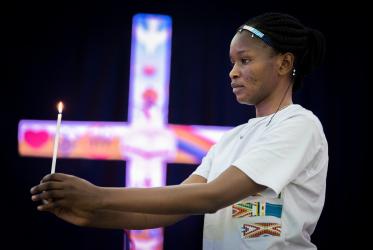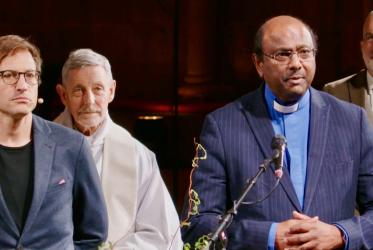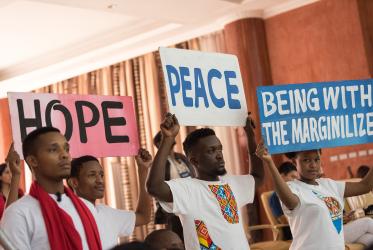A celebration of the 500th anniversary of the Reformation, called the “European Reformation Roadmap,” will begin in November 2016 in Geneva, then tour across sites of significance through May 2017.
There will be activities in 67 cities in 19 countries, featuring a show truck — or “story-mobile” — traveling to different way-stations in Europe to augment local events.
The tour through Europe will start on 3 November in Geneva, the city of John Calvin, and now the head office of the World Council of Churches (WCC) and many other international organizations. The programme, prepared by a local working group, includes seminars, a panel discussion on peace, and a digital exhibition.
Rev. Dr. Emmanuel Fuchs, President of the Protestant Church in Geneva, says, “It is a great honor for us in the Protestant Church of Geneva (in partnership with the World Council of Churches, the Reformation Museum and the Federation of Swiss Protestant Churches) to launch this European tour of Reformation cities.”
“Geneva, certainly, is a key city in the Reformation,” Fuchs adds. “This Geneva stage of the tour gives us an opportunity, quite apart from its historical aspect, to emphasize Geneva’s open, ecumenical and multicultural character. A certain ‘spirit of Geneva’, a product of the Reformation, still permeates our city, beyond the churches.“
Fuchs concludes: “So, the rich, varied programme, intended not only for the friends of the churches, but also for the whole population, for passersby who want to have a look, will provide, among other things, an opportunity to celebrate with our many immigrant communities, an opportunity for our young people from different religions to meet one another and have discussions, or even for families to see a puppet show. We look forward to seeing you on the Reformation truck.”
The culmination of the tour will be in central Germany, at the story-mobile’s final stop in Wittenberg, in time for a World Reformation Exhibition entitled "Gates of Freedom”. There, churches from around the world and civil society exhibitors will present their activities over the summer, illustrating what the Reformation set in motion and what it still means today.
Cities in the Netherlands and in Hungary, in Slovenia and Ireland, will be visited, along with Rome, Augsburg, Worms and Eisenach, which is famous for its Wartburg Castle.
Through the story-mobile and local presentations, past events will come to life again in a dramatic way at each stop. Encounters with local people will bring out the relevance of the Reformation today. Personal story-telling will testify to the contemporary nature of Reformation viewpoints. Every way-station will then send along a memento to the culminating exhibition in Wittenberg.
“The Reformation has exerted a profound influence on the development and formation of Switzerland as a country, and not only through the growing influence of the cities,” stated the Rev. Serge Fornerod, coordinator of the Reformation project at the Federation of Swiss Protestant Churches.
In Wittenberg, leaders from the Evangelical Church in Germany (EKD) have dubbed the commemoration the “Reformation summer of 2017,” and are expecting to attract hundreds of thousands of visitors to Wittenberg for worship on the Elbe riverbanks. A youth camp is also planned in Wittenberg, with 20,000 teenagers already expecting to spend a week there.
“Let us make the Reformation anniversary in 2017 a great festival of Christ, as a testimony to our faith and our hope for a better world!” exclaimed Prof. Dr Heinrich Bedford-Strohm, chair of the Council of the EKD.
A still-reverberating Reformation
Churches in the tradition of the reformation regard 31 October 1517 as the starting point of the Reformation. It was on that date that Martin Luther is said to have nailed his 95 theses opposing the sale of indulgences and what he perceived to be clerical abuses attached to this practice to the door of All Saints’ Church in Wittenberg.
The shaking of the foundations that reverberated 500 years ago from Wittenberg, Zürich, Geneva and many other places changed the fabric of social relations in Europe. This movement radiated out to other continents, influencing whole cultures and regions.
Rev. Anne Burghardt, secretary for ecumenical relations at the Lutheran World Federation, comments, “Five hundred years after its beginning, the Reformation has become a truly global citizen. It is polycentric and has many different expressions worldwide. The occasion of the 500th anniversary of the reformation offers an opportunity to explore its different expressions and ask if and where there is a need for reforms in the churches today.”
WCC general secretary Rev. Dr Olav Fykse Tveit says, “It makes a lot of sense both to celebrate and to face the challenges of today in the one world in the light of the legacy of the Reformation.”
He adds, “We can change to focus on the needs of the other; particularly those who need more attention for the sake of justice and peace. This is about making the best values of the Reformation a living reality today.”






